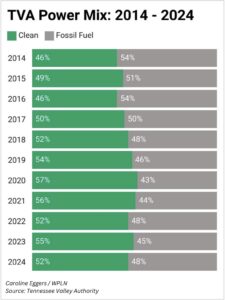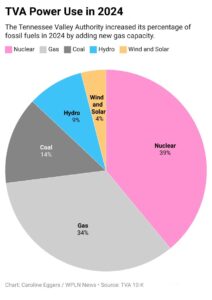
In late March, the Trump administration made a unique offer to power providers: send an email and get out of federal pollution restrictions.
The Tennessee Valley Authority quickly signed up.
Now, the utility that provides nearly all electricity to Tennessee and parts of six other states will not have to comply with an updated rule intended to reduce air pollution from coal burning. President Donald Trump granted TVA’s coal plants, which have been estimated to cause hundreds of premature deaths each year, exemption from the rule for two years.
“This gives EPA time to roll back the regulations all together,” said James Pew, director of clean air practice at Earthjustice, an environmental law group.
The rule, finalized last spring and set to go in effect in 2027, was designed to reduce emissions of mercury, arsenic, nickel and other toxic air pollutants, along with carbon dioxide. It’s known as the “mercury and air toxics standards,” or MATS. Last year, the Environmental Protection Agency said power plant owners could meet the rule’s emissions limits with commercially available control technologies. EPA projected the rule would translate to $300 million in health benefits and $130 million in climate benefits over the next decade, while also reducing adverse environmental impacts.
Last month, EPA pivoted and said a section of the Clean Air Act enables the president to temporarily exempt industrial facilities from new rules if the technology required to meet those rules isn’t available, and if it’s in the interest of national security. This “presidential exemption” could be legally challenged.
“It was never meant to be a complete blanket exemption provision, but that’s kind of the way the president has used it here,” Pew said. “EPA has found that it’s going to have little to no effect on the industry, on electricity prices, on anything like that. So it’s hard to say how it would have any impact on national security.”
It’s part of the Trump administration’s broader effort to roll back environmental regulations on coal and other sources of industrial pollution, benefiting companies and utilities. President Trump has said he wants to bring back coal — a promise he also made during his first term, during which the U.S. retired more coal capacity than under former President Joe Biden.
The updated mercury rule had one other significant provision: In addition to cutting pollution, the rule requires power plant owners to monitor their pollution continuously for the first time ever. People would be able to see the pollution being emitted into their community, in real time, instead of relying on the word of plant owners.
“All industry — not just power plants, but chemical plants, refineries, steel mills, you name it — they’ve all fought tooth and nail for decades because it is so undesirable for them to actually have the public know what they’re emitting,” Pew said.
TVA’s coal plants all get exemptions
TVA has some of the oldest coal plants in the nation. The Shawnee, Kingston and Gallatin plants were constructed in the 1950s. The largest plant, Cumberland, was built in 1973.
All four coal plants will be exempt from the new rule.
“This exemption will allow TVA to keep running these assets in a cost-effective way and help ensure reliability for our 10 million customers,” TVA spokesperson Scott Brooks said in an email. “In general, coal is still an important part of our diverse generation portfolio.”
 Caroline Eggers WPLN News
Caroline Eggers WPLN NewsDespite retiring a portion of its coal capacity in recent years, the Tennessee Valley Authority has not significantly reduced its fossil fuel capacity due to additions of gas plants.
TVA plans to retire all coal plants by 2035. But the utility has “no approved retirement dates” for the Shawnee or Gallatin plants, Brooks said.
The utility has announced formal plans to retire its Cumberland coal plant by 2028 and the Kingston coal plant by 2027. With the exemption, it will be easy for TVA to stick to its original schedule for these two plants, Pew said, as they won’t face the choice of spending money to comply with the new rule or consider closing the plants early.
More: TVA 2020 v. 2030: Why the nation’s largest public utility is not getting cleaner | WPLN News
Nationally, coal use has been declining for more than a decade due to cheaper alternatives, including gas and renewables. Nearly all coal plants in the U.S. are more expensive to run than the cost of building renewable replacements, according to a 2023 study by Energy Innovation, without factoring in tax credits in the Inflation Reduction Act or the new mercury rule.
But TVA got a relatively early start on the trend — after causing the worst industrial spill in U.S. history.
In 2008, TVA’s coal plant in Kingston released more than a billion gallons of coal ash — the toxic leftovers from burning coal — into the surrounding environment, causing a public health and image crisis. The year before, TVA sourced 58% of its electricity from coal.
Since the spill, TVA has gradually reduced its coal use. TVA was down to 24% coal in 2017, a year after the utility brought on another nuclear reactor, and then 16% in 2024.
 Caroline Eggers WPLN News
Caroline Eggers WPLN NewsThe Tennessee Valley Authority has been rapidly expanding its system of gas plants, which use fracked methane to produce electricity.
TVA expects to be down to just 7% coal by 2030.
But the utility is not significantly reducing its use of fossil fuels.
At the same time that TVA retired coal, it has been rapidly expanding its infrastructure that burns another fossil fuel: fracked methane gas. Gas use is projected to increase to 36% by the end of the decade. TVA sourced 7% of its power from gas in 2005.

